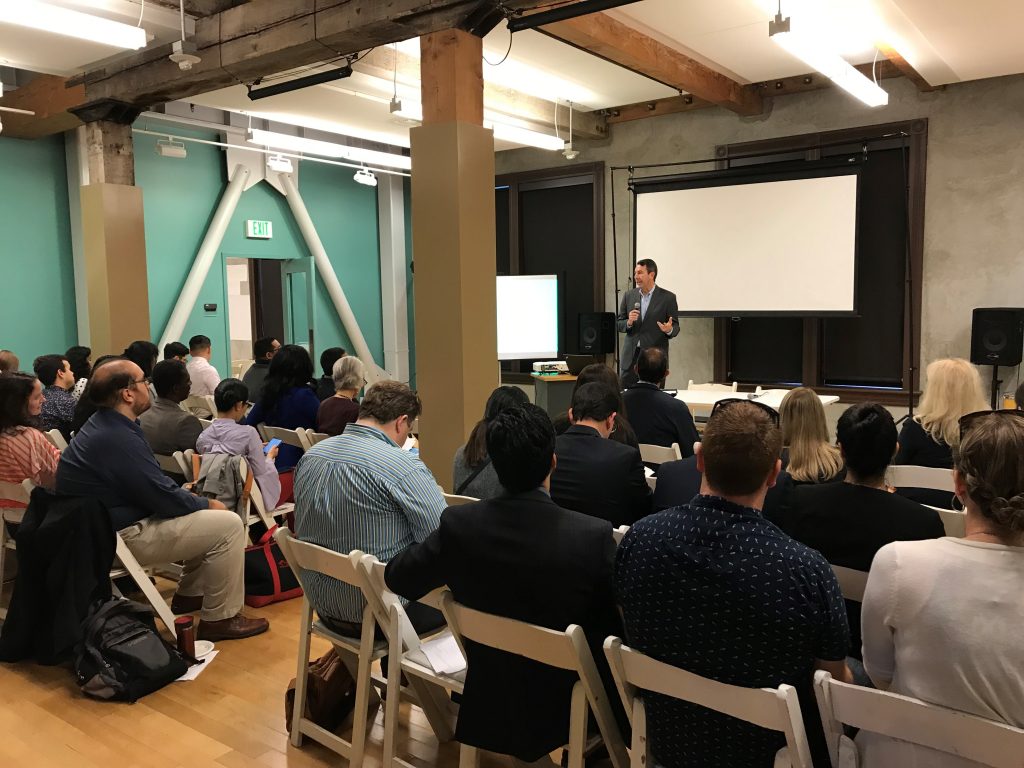UCLA convened public and private sector leaders across Los Angeles County to provide input on the topics of public health and air quality in L.A. County and their intersections with economy and workforce, housing and land use, climate adaptation, and other cross-cutting sustainability topics.

The “Public Health & Air Quality” workshop, held on October 3, 2018 at LA Plaza de Cultura y Artes in Downtown Los Angeles, convened 45 attendees representing 33 public agencies, health entities, healthcare providers, and private companies.
The L.A. County Chief Sustainability Office began the workshop by providing an overview of the Our County plan development process. California Air Resources Board (CARB) Board Member and former California State Assembly member Hector de la Torre spoke about CARB’s work in the region to address and regulate air quality. Monica Guerra from Raimi & Associates followed with a presentation covering key background information, data, and regional findings related to public health issues, factors that cause discrepancies of health outcomes, existing programs, and geographically-specific air quality impacts. Stakeholders in the room all received an accompanying briefing document outlining the information in the briefing presentation.
After the group presentations, workshop participants met in breakout groups to provide feedback on general Public Health & Air Quality draft goals that were included in the briefing and framed the discussion. The second breakout session began with an overview of selected Case Studies from L.A. County departments, each evoking a different cross-cutting sustainability topic. The final breakout session had attendees pair off and come up with an idea for a public-private partnership opportunity that aligns public health and air quality.
Key Takeaways
- Stakeholders wanted more ambitious language in the goals, especially given the aspirational nature of the eventual Plan. They specifically requested language that was simultaneously measurable and ambitious, so that residents could easily determine whether each goal has been met.
- To implement these goals, stakeholders often suggested data-based monitoring programs for both businesses and communities, using the data-driven approach of Goal B but expanding it to include communities’ own methods of data collection. Stakeholders were interested in creating community monitoring programs that collected data regarding air quality problems, especially in frontline communities. Participants expressed specific interested in requiring expanded permitting requirements for businesses that impact air quality and public health.
- Stakeholders continually suggested bottom-up approaches to community initiatives with the County. Participants called into question whether the term “place-based” broadly enough captures different kinds of communities and community leaders that should be involved in initiatives and engagement (such as schools, churches, daycare, etc.) They felt L.A. County should provide more informal community leaders the opportunity to formally engage with government entities regarding aspects in environmental, landscape, and other health issues.
- Throughout this workshop, stakeholders were keen to continually point out how L.A. County’s role in creating better public health and air quality outcomes is directly linked to the County’s public realm and to land use decisions. Participants pushed for implementations like more trees, shade canopy, “cool roofs”, and “cool roads” to reduce heat impacts and sequester carbon. There was a strong emphasis on enacting regulations that focus on not just outdoor air quality, but indoor air quality as well through building codes and housing laws.
- Finally, stakeholders focused on ways in which Plan goals and strategies could improve technology used in businesses, community monitoring systems, and transportation throughout the County. They felt that improved technology will allow businesses and transportation to emit less harmful pollutants, while improved community monitoring technology will ensure communities to know the types and amount of pollution surrounding them.
Comments on the key recommendations can be directed to sustainability@lacounty.gov.
Read more in the Public Health Public Private Workshop Summary
Download the Public Health Public Private Workshop Notes
Download the Public Health and Air Quality Workshop Presentation
Download the Our County Public Health and Wellbeing Briefing
